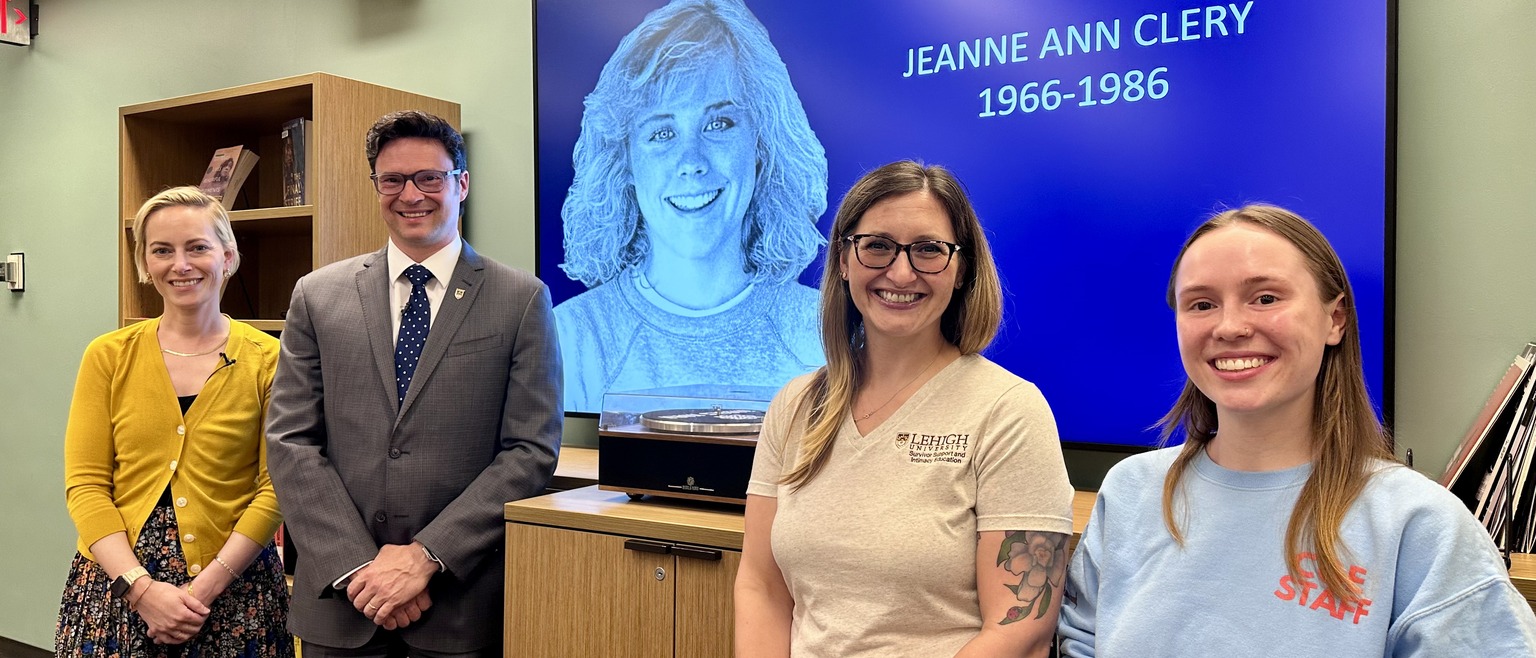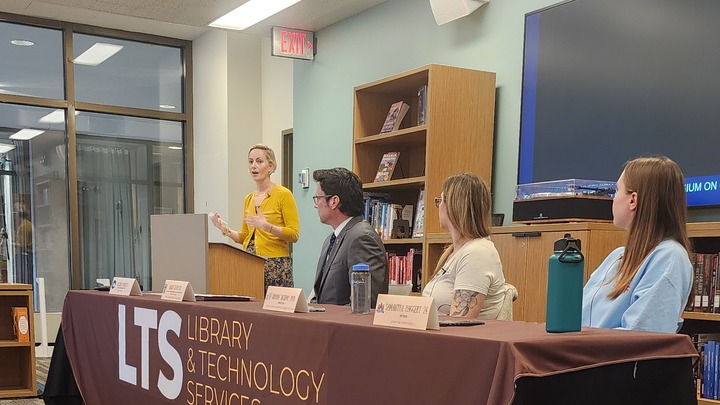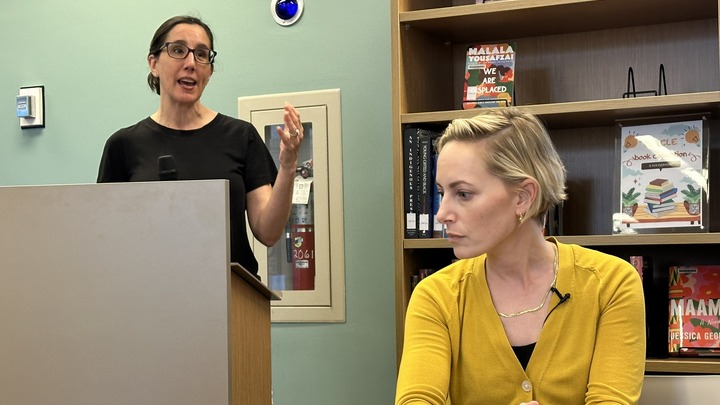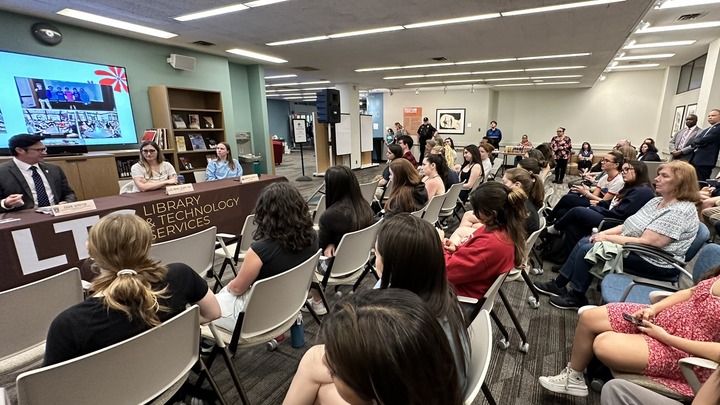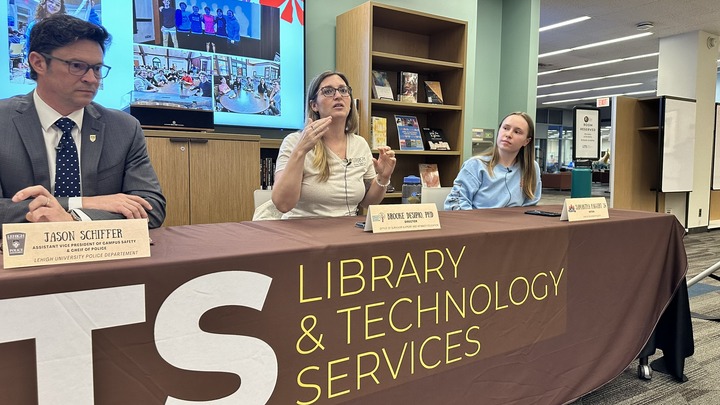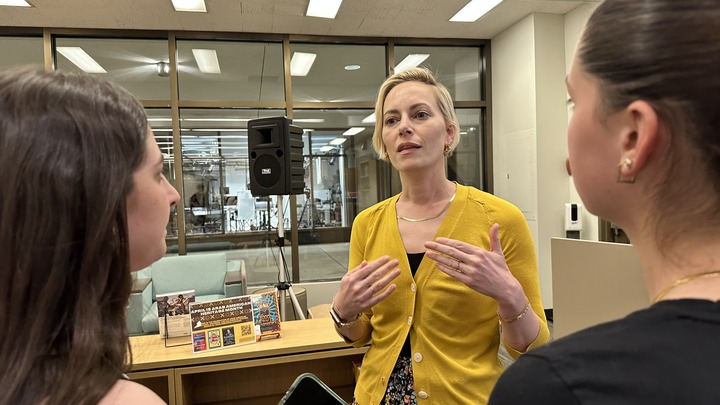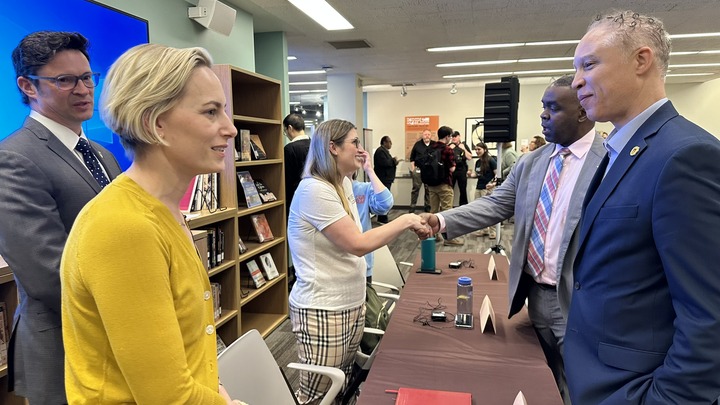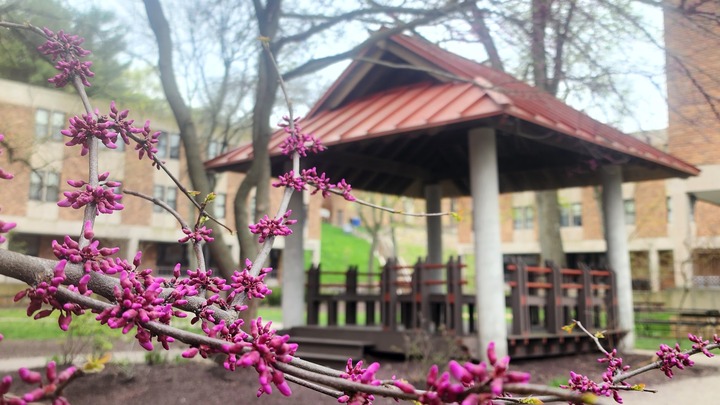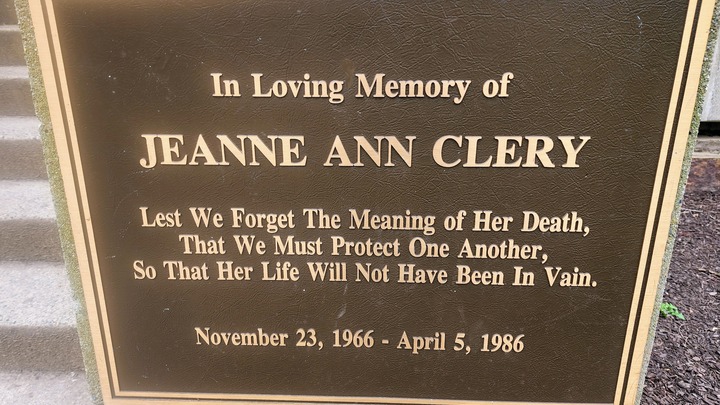Above l-r: Jessica Mertz, Executive Director of the Clery Center; Jason Schiffer, Assistant Vice President of Campus Safety and LUPD Chief of Police; Brooke DeSipio, Ph.D., Director of the Office of Survivor Support and Intimacy Education; and Samantha Haggert '24, Intern, Center for Gender Equity
On April 15, more than 50 students, staff, and faculty gathered at the LTS CIRCLE in Fairchild-Martindale Library for Remembering Jeanne: The Clery Act & Campus Safety. Participants celebrated the life of Lehigh student Jeanne Clery, a gifted student and athlete who was tragically raped and murdered in 1986 during her freshman year. Following her death, Clery's parents championed the issue of campus safety and brought the problem of campus crime to national attention. Their advocacy led to the passing of the Clery Act, which provides transparency around campus crime policy and statistics.
Also known as the Crime Awareness and Campus Security Act of 1990, the Clery Act requires colleges and universities to report campus crime data, support victims of violence, and publicly outline their policies and procedures for campus safety. The Clery family also established the Clery Center, a national nonprofit dedicated to helping college and university officials comply with the Jeanne Clery Act.
Jessica Mertz, Executive Director of the Clery Center, shared stories about Jeanne, who was remembered as quiet, funny, beautiful, and friendly with kind eyes and an affecting laugh. An elite-level tennis athlete, at the time she would have been described as a "tomboy." Challenging the 1980s gender norms, she was known for her independence and deeply competitive spirit. There was a running joke among her friends that to entice others to a match, she offered to remove her contact lenses.
Jeanne was thriving at Lehigh and growing into an independent, self-aware, strong young woman. Asked to describe Jeanne, her mother Connie responded: “She was my gift from God.” She recalled how Jeanne fell in love with Lehigh during their on-campus visit, and how she loved her Lehigh friends. The Clerys had been relieved that their daughter chose to attend Lehigh, which they perceived as safer than another school under consideration. But on April 5 of her first year at Lehigh, Jeanne was murdered in her dorm room by another Lehigh student who she did not know.
I did not know Jeanne personally, but I can say that she has changed my life. And I think for anyone who has been in any college in the United States after 1990, she has probably changed your life too, in ways that you may not even know. -- Jessica Mertz, Clery Center Executive Director
Jeanne's story might have ended the night she was murdered, but for her family's strength and resolve. Connie and Howard Clery were determined to make her death the impetus for positive change and they helped make campus safety part of the national conversation. Together they established the Clery Center, a non-profit organization to guide colleges and universities on the implementation of effective campus safety measures, in 1987.
Mertz described the work of the Clery Center and the Clery family's advocacy for new campus safety legislation. She shared a photo of the Clerys meeting with then-President George H.W. Bush in the White House Rose Garden. Bush had opposed the Clery Act until he met the Clerys and listened to their story. Their conversation changed his mind about the Act. In the decades since, the Clery Center remains dedicated to guiding institutions of higher education.
Jason Schiffer, Assistant Vice President of Campus Safety and Lehigh University Police Department Chief of Police, spoke on the significance of the Clery Act to today's students and families. "At its heart the Clery Act is a right to know law. The Clery Act has given students and parents the information they need to know about the real occurrences of crime on any campus across the United States — and certainly on the Lehigh campus," he said.
From advocacy to action
Schiffer described Lehigh's continuing efforts to heighten awareness of crimes occurring on campus and the support services available both through the Lehigh University Police Department (LUPD) and many other campus offices. He said two of the major products of the Clery Act are the Annual Security & Annual Fire Report, which contains campus crime statistics over the last three years, and Timely Warnings and Emergency Notifications, issued through the Lehigh HawkWatch app and other notification channels. These channels are used when certain crimes -- such as sexual assault, dating violence, aggravated assault, stalking, weapon or drug violations, and hate crimes -- are considered an immediate threat to the campus community. The HawkWatch app also incorporates campus safety and support resources, as well as numerous personal safety features such as Emergency Mobile Blue Light and Virtual Walk Home.
Schiffer also noted the creation of Campus Security Authorities (CSA), individuals by virtue of their university responsibilities under the Clery Act, designated to receive and report criminal incidents to the Division of Campus Safety. There are over 850 CSAs at Lehigh, among them, 200 Gryphons and orientation leaders.
Brooke DeSipio, Ph.D., Director of the Office of Survivor Support and Intimacy Education (SSIE), shared a personal connection to Lehigh and to the Clery story. Her grandparents were long-time Bethlehem residents and all of their children attended Lehigh. "I distinctly remember my grandmother being very much invested in the Clery family and reading about their advocacy efforts in the newspaper," she said. As a freshman at Lehigh, DeSipio lived in Lower Cents, and she recalled, "there were lots of conversations, myths, and stories about the murder." At another point in her Lehigh tenure, she had the privilege of hearing Connie Clery speak on campus at a Safety Summit conference.
DeSipio went on to describe prevention and support services available to Lehigh students impacted by gender-based violence, including a dozen advocate faculty and staff volunteers on call 24/7 to provide relief, support, and resource options to victims of gender violence including sexual assault, rape, intimate partner abuse, dating, domestic violence, stalking, as well as broader uncomfortable interactions students may experience. Her office engages in prevention efforts with 40+ student educators, and organizes events like the Sex Communication Workshop Series and the Take Back the Night silent march and discussion, held annually during Sexual Assault Awareness Month. SSIE also partners with local organizations such as the Crime Victims Council of the Lehigh Valley, Clear Path Wellness, and Lehigh Valley Health Network to provide essential services to survivors of gender-based violence.
Samantha Haggert '24, an intern at the Center for Gender Equity, reflected on the Clery Act's impact on her own campus experience. "I've always been around the blue lights and HawkWatch notifications have helped me to be prepared and aware of what is going on around campus," Haggert said. She related the Act to the work of the Lehigh Center for Gender Equity, which is driven by research, advocacy, and activism and aims to break gender expectations and eliminate sex/gender inequity on campus. Their lounge on the third floor of Christmas Saucon is open to faculty, staff, and students. "After hearing what Jeanne was like tonight, I feel she would really enjoy programs that we have, the androgynous energy she brought really fits into what we have, our efforts to break gender expectations," she said. Among the office programming is diverse outreach such as pop-up educational events, student-led creative projects such as Art Night, a student-authored feminist magazine In my Birthday Suit, and podcasts, including Haggert's The G-Spot podcast on breaking gender norms.
At the start of the event, a moment of silence was observed to remember Jeanne Cleary. The quiet reflection in the LTS CIRCLE was powerful, not only because Jeanne was part of the Lehigh community, but because her death was made meaningful through her family's actions to improve safety for universities nationwide.
Library and Technology Services thanks our panelists for sharing their expertise on campus safety and resources and encourage readers to visit their websites for more information on the Clery Act, Lehigh campus safety efforts, and support resources for the entire campus community:
- Clery Center
https://www.clerycenter.org/ - Student Health & Campus Safety: https://www2.lehigh.edu/student-life/student-health-and-campus-safety
- Lehigh University Police Department
https://police.lehigh.edu/ - Office of Survivor Support and Intimacy Education
https://studentaffairs.lehigh.edu/ssie - The Center for Gender Equity
https://diversityandinclusion.lehigh.edu/center-gender-equity
This event was supported by Library and Technology Services, the Clery Center, Lehigh University Police Department, Office of Gender Equity, and the Office of Survivor Support and Intimacy Education.
